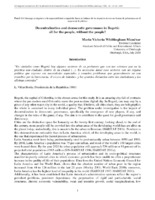| dc.contributor.author | Whittingham Munevar, María Victoria | |
| dc.date.accessioned | 2018-09-02T05:37:10Z | |
| dc.date.available | 2018-09-02T05:37:10Z | |
| dc.date.issued | 2005-10 | |
| dc.identifier.uri | http://cladista.clad.org//handle/123456789/3661 | |
| dc.description.abstract | Maybe the most important political milestone of the last decades in the twentieth century was the endorsement of a New Constitution in 1991. | |
| dc.description.abstract | The need for institutional reforms in Colombia was self-evident; the social contract was (is) threatened by growing social unrest, and several failed trials to endorse peace agreements had proven that without deep changes in the country's political structure, peace and development wouldn't be possible (Alesina 2000). | |
| dc.description.abstract | The New Constitution included special provisions for Bogotá, the county's capital, with the aim of closing the gap between the city's growth and its institutional development. | |
| dc.description.abstract | The status of the city was changed from D.E. Distrito Especial (Especial District) to D.C. Distrito Capital (Capital District) in search of granting the city its political, administrative and economic autonomy; decentralization was considered the model for a new city (Zubiría Samper 1994; Castro C. 1991). | |
| dc.description.abstract | Many believe that Bogotá is the most successful example of decentralization in the country; others, that it is the only one, and others that the process did not start at all. | |
| dc.description.abstract | A general perception is that there are not real changes in the city's system of governance; the reforms appeared insufficient to change the political and cultural histories of the city and the country. | |
| dc.description.abstract | What is certain is that in facing a widespread offer of mechanisms for political participation citizens seem to be not interested. My hypothesis is that the offer is not perceive as proper and did not have the minimum trust required. Following my own experience and evidence from the process, I dare to say that the decentralization reform has been excessively centralist in its approach. | |
| dc.description.abstract | The proposal was not discuss with citizens, did not search for, recognized, or celebrate, forms and structures of organization and participation that existed within the city; additionally expectations of those promoting the reform did blind them from recognizing the needs, values, ideals, and potential of the people. All for the people, without the people. | |
| dc.format.extent | 22 p. | |
| dc.language | Inglés | |
| dc.publisher | World Affairs Council of Pittsburgh | |
| dc.rights | Creative Commons BY-SA-NC 4.0 Int | |
| dc.rights.uri | http://creativecommons.org/licenses/by-nc-nd/4.0/ | |
| dc.subject | CONGRESO CLAD 10-2005 | |
| dc.subject | PARTICIPACION CIUDADANA | |
| dc.subject | DESCENTRALIZACION | |
| dc.subject | GOBIERNO MUNICIPAL | |
| dc.subject | ESTUDIO DE CASOS | |
| dc.subject | ESTADISTICAS | |
| dc.title | Decentralization and democratic governance in Bogota: all for the people, without the people? | |
| dc.type | article | |
| clad.congress | Congreso Internacional del CLAD sobre la Reforma del Estado y de la Administración Pública, 10 | |
| clad.key | MFN37264--37264 | |
| clad.key1 | KEY37264 | |
| clad.region | COLOMBIA | |
| clad.md5 | 05cc2a8ddead389f6ee256c5933d1180 | |


